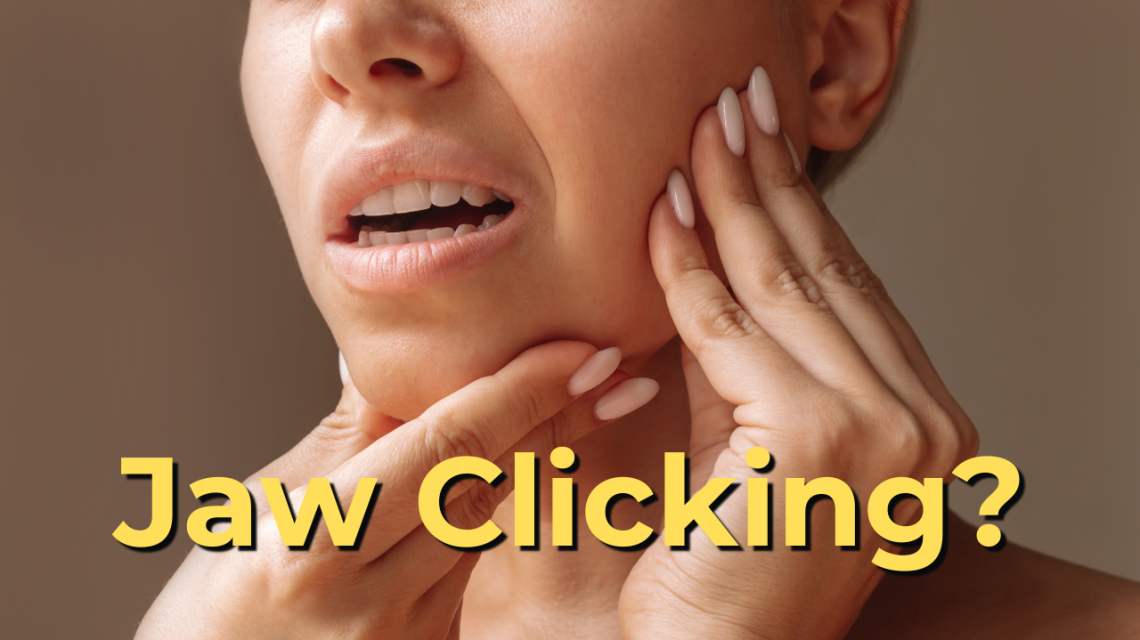Introduction
Have you ever noticed a clicking or popping sound when you open or close your mouth? While it might seem harmless, it could be a sign of an issue with your jaw joint, known as the temporomandibular joint (TMJ). This joint plays a crucial role in your daily life—helping you speak, chew, and yawn. When something isn’t working quite right, it can lead to discomfort or other problems.
In this article, we’ll explain what causes TMJ clicking, why it matters, and what you can do to address it.
What Causes TMJ Clicking?
The clicking sound happens when the TMJ isn’t moving as smoothly as it should. Here are the most common reasons:
- Disc Displacement: Inside your TMJ is a small, cushion-like disc that helps your jaw move smoothly. If this disc moves out of place, your jaw might “click” as it snaps back into position.
- Tight or Overworked Muscles: Clenching or grinding your teeth, chewing gum excessively, or even stress can strain the muscles around your jaw. This tension can affect how your TMJ functions and result in popping sounds.
- Inflammation or Joint Issues: Sometimes, clicking is linked to joint inflammation or other underlying conditions, such as arthritis.
Should You Be Concerned About TMJ Clicking?
TMJ clicking is often the first sign of TMJ disorder. For many people, it’s “just a sound” with no other symptoms. This is why it so often gets ignored. But clicking in your Temporomandibular Joint is a sign that your jaw is being moved into an incorrect position resulting in the articular disc being displaced forward. This can lead to other TMJ Disorder symptoms like:
- Pain in your jaw, face, or ears.
- Difficulty opening or closing your mouth.
- Locking of your jaw in an open or closed position.
- Frequent headaches or neck pain.
These could be signs of TMJ dysfunction, a condition that affects how your jaw joint works. Left untreated, it can lead to more serious issues, like chronic pain or difficulty eating and speaking.
How Is TMJ Clicking Diagnosed?
When you visit a dentist or TMJ specialist, they’ll use several methods to understand what’s causing the clicking:
- Discussing Your Symptoms: Your dentist will ask about your habits, like clenching or grinding your teeth, and if you’ve ever had injuries or stress that could affect your jaw.
- Examining Your Jaw: They’ll check how your jaw moves, listen for clicking sounds, and feel for tension in your jaw muscles.
- Imaging Tests: For more complex cases, your dentist might use advanced imaging like an X-ray, CBCT scan, or MRI to get a closer look at your jaw joint and surrounding tissues.
How Is TMJ Clicking Treated?
The good news is that TMJ clicking can often be managed with simple, non-invasive treatments. Here are some common options:
Lifestyle Changes:
- Avoid Hard or Chewy Foods: Stick to softer foods to give your jaw a break.
- Stress Management: Relaxation techniques can help reduce clenching and grinding caused by stress.
- Posture Awareness: Poor posture can put extra strain on your jaw, so try to sit up straight.
Night Guards or Splints:
If you grind or clench your teeth, your dentist might recommend a custom-made night guard. This device protects your teeth and reduces pressure on your jaw.
TMJ Orthotics:
For more severe cases, a custom orthotic can be made to help realign your jaw and stabilize the joint. This can relieve pain and improve how your jaw moves over time.
Conclusion
Your jaw might be clicking to tell you something important, so don’t ignore it.
Talk to your dentist today to learn more about TMJ care and how you can keep your jaw working smoothly and pain-free!
– Written by Dr. Agatha Bis




